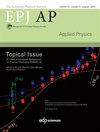腔体参数对水下脉冲放电冲击波传播的影响
IF 0.9
4区 物理与天体物理
Q4 PHYSICS, APPLIED
引用次数: 0
摘要
为了优化水下脉冲放电产生的冲击波,通过三维数值模拟进一步研究了空腔参数与冲击波传播的关系。根据模拟得到的声压场分布,可以清楚地观察到激波被反应堆壁反射的情况。反射压力波将达到最大值,然后逐渐衰减。研究还发现,当沉积能量一定时,当电弧通道的初始半径从0.1 mm增加到2.5 mm时,激波的最大振幅将从0.22 × 105 Pa增加到1.70 × 105 Pa。当电弧通道初始半径一定时,随着沉积能量的增加,激波辐射时间提前,激波最大振幅增大。这意味着通过增加沉积能量的输入可以产生更高的压力。当沉积能量一定时,通过增大通道的初始半径可以获得更高的压力水平。激振频率对激波幅值也有影响。较高的激励频率可以获得较高的压力幅值。这些方法将提高水下脉冲放电处理细菌的效率。本文章由计算机程序翻译,如有差异,请以英文原文为准。
Effect of cavity parameters on the propagation of shock wave generated by underwater pulsed discharge
In order to optimize the shock wave generated by underwater pulsed discharge, the relationship between cavity parameters and shock wave propagation is further studied by three-dimensional numerical simulation. According to the sound pressure field distribution obtained by the simulation, the reflection of the shock wave by the reactor wall can be clearly observed. The reflected pressure wave will reach its maximum value and then gradually attenuate. The study also found that when the deposition energy is constant, when the initial radius of the arc channel increases from 0.1 mm to 2.5 mm, the maximum amplitude of the shock wave will increase from 0.22 × 105 Pa to 1.70 × 105 Pa. When the initial radius of the arc channel is constant, as the deposition energy increases, the time to radiate the shock wave becomes earlier, and the maximum amplitude of the shock wave will increase. This means that a higher pressure can be generated by increasing the input of the deposition energy. When the deposition energy is constant, a higher-pressure level can be obtained by increasing the initial radius of the channel. The excitation frequency also affects the shock wave amplitude. Higher excitation frequency can obtain higher pressure amplitude. These methods will increase the efficiency of underwater pulse discharge treatment of bacteria.
求助全文
通过发布文献求助,成功后即可免费获取论文全文。
去求助
来源期刊
CiteScore
1.90
自引率
10.00%
发文量
84
审稿时长
1.9 months
期刊介绍:
EPJ AP an international journal devoted to the promotion of the recent progresses in all fields of applied physics.
The articles published in EPJ AP span the whole spectrum of applied physics research.

 求助内容:
求助内容: 应助结果提醒方式:
应助结果提醒方式:


